Corsair Obsidian 550D: Starting to Specialize
by Dustin Sklavos on March 29, 2012 3:01 PM EST- Posted in
- Cases/Cooling/PSUs
- Corsair
- mid-tower
Noise and Thermal Testing
Since we currently only have test results for the Corsair Obsidian 550D based on our new testbed and methodology, this is going to be a relatively short breakdown. Still, there's useful information to be had.
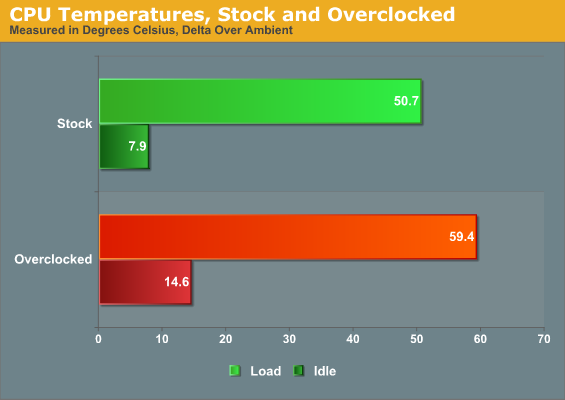
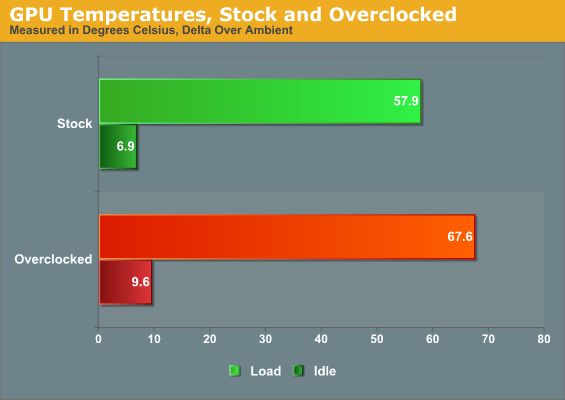
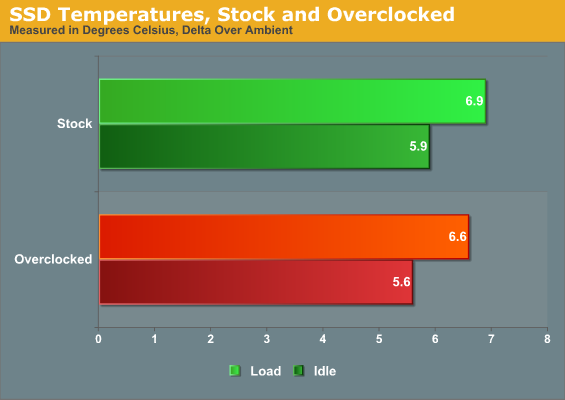
Under the new testing rubric it can be a little difficult to figure out what's going on. First, we can see the CPU and GPU both get about a 10C increase in temperature when overclocked in the Obsidian 550D, while idle temperature increases are nowhere near as severe. The ambient temperature when testing was ~22C, which would result in absolute thermals in the 80s for the CPU...not the greatest results but not dangerous either. GPU thermals are at the 90C threshold, but when you see our fan speed results you'll see the GTX 560 Ti still has some headroom before actually overheating. Meanwhile, the SSD temperatures are within the margin of error; the increased stress from the CPU and GPU in the overclocked configuration doesn't impact the SSD in any noteworthy way.
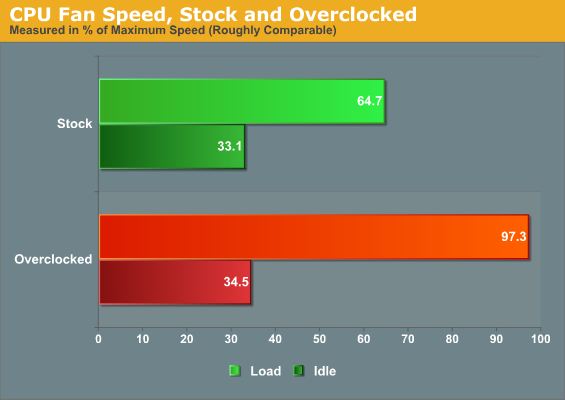
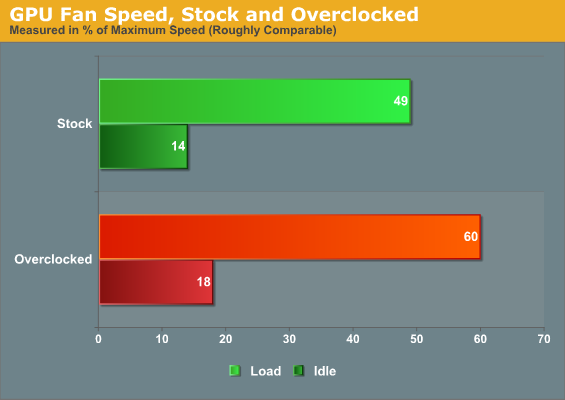
While thermal performance isn't horrible, the fans definitely had to work reasonably hard to keep things under control. The Hyper 212 Evo's fan is virtually maxed out by the thermal load; in practical terms, the 550D in its stock configuration just doesn't seem to have that much of a ceiling for CPU overclocking. Meanwhile, the 560 Ti's fan speed gets a substantial enough jump to prove noticeable, but end users who demand more power will likely meet the limitations of the silicon itself before they hit the limits of the cooling system.
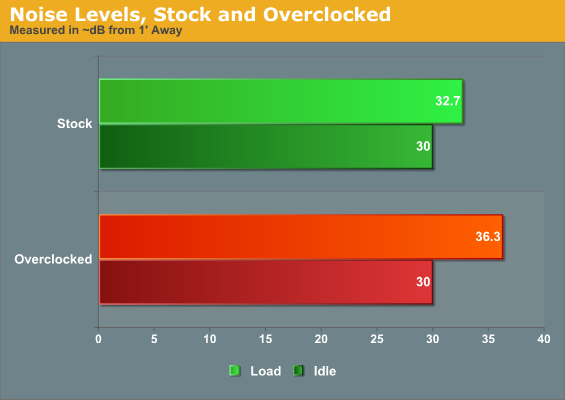
Since 30dB is the floor for our sound meter, we can safely say the Corsair Obsidian 550D is able to keep things under control while the system is idling, regardless of whether or not the components are overclocked. Under load the 550D remains very quiet; in a silent room the difference is noticeable, but in practical use it's far less likely. Unfortunately, when overclocked the 550D has a harder time keeping the noise down; the high pitch of the GTX 560 Ti's fan, in particular, makes itself known.










59 Comments
View All Comments
cbgoding - Thursday, March 29, 2012 - link
Why do reviewers throw a ton of voltage at a chip for a weak overclock? 1.38v is what I use to hit 4.9GHz. Just strikes me as weird.Dustin Sklavos - Thursday, March 29, 2012 - link
1. Stability.2. Ease of testing. For the case, whether or not the overclock itself is fast is irrelevant, we're just looking to see how it dissipates the heat.
compudaze - Thursday, March 29, 2012 - link
Not all chips are created equal. I have had one 2600K that hit 4.8GHz on 1.32V while another took a whopping 1.48v to hit the same 4.8GHz. They call it the "silicon lottery" for a reason.pdjblum - Thursday, March 29, 2012 - link
There are still some of us who prefer aluminum to steel. What I am saying is that the material is as important to some of us as are the dimensions and other specs, so it would be great if it was also listed in an easy to find location.Rasterman - Thursday, March 29, 2012 - link
If you use quality fans at low speeds, there is no reason you need an isolation, dampening design to block noise, there simply is no noise. I went with a Lian Li AL case, short ATX, 2 unused 5.25 bays, it is absolutely silent at idle, plus it weighs less than 20# which makes moving it around a hell of a lot easier. Overclocked to 4.9GHz I don't need to ramp the fans for the CPU, I have a similar video card that does ramp though and it is by far the loudest thing at load, probably similar to this review.Iketh - Friday, March 30, 2012 - link
You've never had a computer running on hard floors then...jabber - Friday, March 30, 2012 - link
So some form of dampening material under the PC is required?Cork tiles or suchlike.
I used to use a Mission Isoplat.
ssddaydream - Saturday, March 31, 2012 - link
I respectfully ask that you don't preach cases being "absolutely silent" when indeed they are not. I have worked with many components that advertise extremely quiet when they actually have very irritating noise characteristics.Your computer may be silent to your ears, but other people may have more acute hearing.
I have a "silent" computer- it uses absolutely no fans and it only uses an SSD (no conventional HDD). It, for all practical purposes, is silent. If you put your ear up to the power supply, you can barely hear the faint switching and other noise, which is measurable by my mic with RTA. In any case, I can't hear it when my ear is 5" or more from the PSU.
A case with conventional HDDs and fans is never silent- only quiet. How quiet is a matter of the listener unless measurements are taken.
I don't expect a detailed RTA analysis for case reviews, so I try to find the quietest gear available based on many people's reviews as well as professional reviews. Many sites that review case fans, etc, will post actual recorded noise so you can get an idea of the noise signature.
Unfortunately, the more powerful the computer, the more noise. I relocated some of my machines into a different building where I use Remote Desktop / VNC to access them.
Thanks Anandtech for bringing to light cases like this. I am all for acoustic and thermal comparisons and recommendations between any cases you guys have experience in.
haelio - Thursday, March 29, 2012 - link
"In terms of thermal performance, it's tough to make a direct comparison to Corsair's other cases."No it's not, you get other cases, put the same hardware in it and then take measurements again.
I've seen better case reviews by random purchasers on enthusiast forums. This was just a series of subjective opinions on the aesthetics and then a few graphs without any context, mention of the ambient temperatures or fan layout (presumably stock?).
I expect more from a site like Anandtech. If this review popped up on CNET I wouldn't be complaining.
For a better comparison of:
CPU temps: http://hexus.net/tech/reviews/chassis/36473-corsai...
Noise: http://hexus.net/tech/reviews/chassis/36473-corsai...
SilthDraeth - Thursday, March 29, 2012 - link
I have to agree with the above poster. Though, I am guessing you guys do not keep review hardware around forever. However, it would make sense to have a pretty standard case review test suite with a standardized hardware setup. Presumebly something you know will get quite hot in a poorly designed case.Then just keep that stuff in house and when new cases come for review, you pop the stuff in and run the tests, then you can easily pull up your numbers for other cases and compare and contrast.